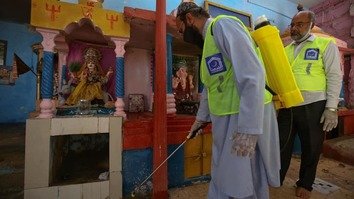KARACHI -- For Pakistan, Ramadan is not just a month of spiritual and religious importance for Muslims, it is also a time to unite family and friends and to promote interfaith harmony.
In a bid to encourage interfaith and inter-sect harmony and to reduce hatred and intolerance, leaders from both Muslim and non-Muslim communities organise iftar events, where members of various faiths can share a meal together.
Hazrat Allama Muhammad Ahsan Siddiqi, a Karachi-based religious scholar who heads the Interfaith Commission for Peace and Harmony (ICPH), has been organising such iftar events every year.
Last year during Ramadan, ICPH organised an iftar at Saint Patrick's Cathedral in Karachi, attended by a number of leaders of various faiths and sects.
"For activists working on promotion of interfaith harmony, Ramadan is an ideal month," Siddiqi told Pakistan Forward.
This year, he plans to organise an iftar mid-Ramadan.
"The idea behind such iftars is to gather religious leaders at one table, where they can eliminate ... inter- and intra-religious disputes through dialogue," he said.
Promoting interfaith harmony
Many attempts to promote interfaith harmony take place during the Muslim holy month.
Some non-Muslim individuals host iftars for their Muslim friends, while many Muslims send fruits and other food to their non-Muslim neighbours to demonstrate solidarity.
Sardar Ramesh Singh, patron-in-chief of the Pakistan Sikh Council, which represents the Pakistani Sikh community, arranges iftar events regularly.
"It helps us to share each others' faiths and understanding on the topic of fasting in our respective religions," Singh told Pakistan Forward.
For example, fasting during Ramadan is a pillar of Islam, while Sikhism rejects fasting as a religious practice.
Nonetheless, a majority of non-Muslims in Pakistan do not eat or drink outside their homes during Ramadan to show respect for Islam, said Singh.
Roadside iftar stalls
As demand increases during Ramadan and Eid ul Fitr, so do the prices of some essentials like fruits, vegetables and other groceries.
To help ease the burden on poor Pakistanis and on those who cannot make it home from work in time to break the fast, charity organisations, traders' associations and individuals arrange thousands of iftar stalls offering free food.
A number of volunteers can be seen along major roads during Ramadan, distributing iftar boxes to commuters in buses and cars who have to break their fast in transit.
Syed Shakeeb, a leading trader in the Guru Mandir area of Karachi, has been organising iftar events every year for the past three decades.
"In Karachi, arranging roadside iftars during the entire month of Ramadan -- offering food and drinks to travellers and the needy -- has become a tradition," he told Pakistan Forward.
Atrocities during Ramadan
In years past, terrorist outfits such as the "Islamic State of Iraq and Syria" (ISIS) and Tehreek-e-Taliban Pakistan (TTP) have increased their subversive activities during Ramadan.
Last year, ISIS in its newsletter al-Naba boasted of killing or injuring more than 5,200 people in 14 terrorist attacks in several countries during Ramadan, The Independent reported July 13.
The newsletter gives a breakdown of the victims, who include almost 2,000 Shia, 1,000 Kurds, 600 Syrian Alawites and 300 Christians, among others.
Pakistani clerics take the opportunity during Ramadan rituals and gatherings to condemn militant groups' atrocities and killing of innocent civilians.
The Pakistan Ulema Council (PUC), a country-wide body representing religious scholars, issued a fatwa May 11, 2016, condemning ISIS and saying that the group violates Islamic teachings.
Terrorist groups have nothing to do with Islam, said PUC Chairman Maulana Tahir Mehmood Ashrafi.
"The ISIS militant group kills innocent civilians -- both Muslims and non-Muslims -- in its terrorist activities during the holy month of Ramadan," he told Pakistan Forward. "In fact, it's maligning Islam."
Muslims cannot support the killing of innocent people and destruction of their property by ISIS, he said.

![A Pakistani volunteer serves Iftar food to Muslim devotees preparing to break their fast at Faisal Mosque in Islamabad on June 17, 2016 during the holy fasting month of Ramadan. [Aamir Qureshi/AFP]](/cnmi_pf/images/2017/05/25/7987-000_c081x-585_329.jpg)






